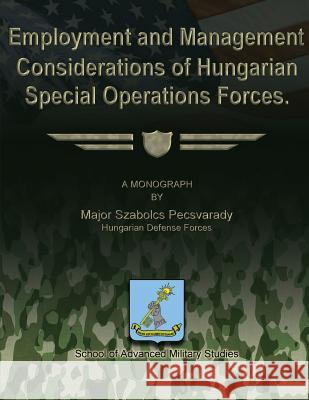Employment and Management Considerations of Hungarian Special Operations Forces » książka
Employment and Management Considerations of Hungarian Special Operations Forces
ISBN-13: 9781479271160 / Angielski / Miękka / 2012 / 60 str.
Employment and Management Considerations of Hungarian Special Operations Forces
ISBN-13: 9781479271160 / Angielski / Miękka / 2012 / 60 str.
(netto: 61,11 VAT: 5%)
Najniższa cena z 30 dni: 64,17
ok. 16-18 dni roboczych
Bez gwarancji dostawy przed świętami
Darmowa dostawa!
Hungary has hardly begun the development process of her own special operations capability (SOC). In a way, the Hungarian Defense Forces (HDF) is in an advantageous position. There are role models, examples and proven methods available to adopt from the experiences of its coalitional partners. At the same time, however, there are not even comparable amounts of resources available, and frequently, economic considerations easily override professional ones in the life of the small and still vulnerable Hungarian Special Operations Forces (HUNSOF). The HDF may endanger the capabilities of HUNSOF by misusing it in combat and mismanaging it in peacetime, either because of necessity or by the mistakes of the planners or decision-makers. To avoid this, Hungarian planners should identify and consider several factors in relation to the employment and management of special operations forces, to negate the short- and the long-term effects of misuse or mismanagement. The monograph seeks to answer to two questions, which leads to the justification or denial of the thesis. First, how well does the doctrinal background support the effective use of HUNSOF in combat operations? Second, how well does the HDF acknowledge certain management requirements of HUNSOF as quality assurance measures? The first question is important, since deficiency in doctrines results in faulty planning, which leads to the possible destruction of SOF in combat. The second question is important because a military organization's (in this case, HUNSOF's) combat capabilities rest on its peacetime management.
Zawartość książki może nie spełniać oczekiwań – reklamacje nie obejmują treści, która mogła nie być redakcyjnie ani merytorycznie opracowana.











